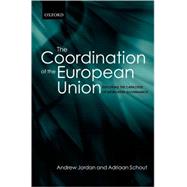
| Political Ambitions and Coordination Capacities: The management of horizontal and vertical interdependence | |
| Multilevel Coordination Capacities | |
| Environmental Policy Integration at EU Level: A catalogue of coordinating capacities | |
| The Coordination of European Union Policy: Actor perspectives | |
| Environmental Policy Integration: Actor perspectives | |
| Germany: A reactive and passive coordinator? | |
| The Netherlands: From event to issue coordination? | |
| The United Kingdom: Strong administration but weak political ambitions? | |
| The European Commission: An organization in transition? | |
| The European Parliament: A partially disengaged partner? | |
| The Coordination of the European Union: Understanding the capacities of networked governance | |
| Table of Contents provided by Publisher. All Rights Reserved. |
The New copy of this book will include any supplemental materials advertised. Please check the title of the book to determine if it should include any access cards, study guides, lab manuals, CDs, etc.
The Used, Rental and eBook copies of this book are not guaranteed to include any supplemental materials. Typically, only the book itself is included. This is true even if the title states it includes any access cards, study guides, lab manuals, CDs, etc.